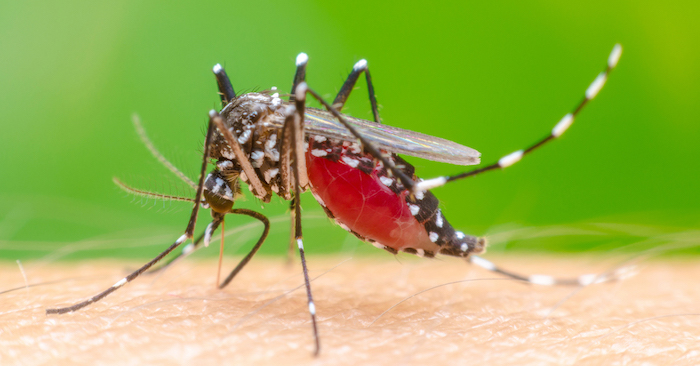
At Tedderfield, June is Mosquito Awareness Month!
As we mentioned in an earlier blog post, the Centers for Disease Control and Prevention published a report in May, 2018 that diseases from mosquitoes, ticks and fleas more than tripled between 2004 and 2013. This is an astonishing increase.
One of our goals is to help you learn more about mosquitoes, the diseases they carry, and how best to protect yourself from mosquito bites.
Because this has never been more important, every day in June, we will post important information about mosquitoes, how to prevent mosquito bites, what you should know about mosquito borne disease, the best mosquito repellents, and much more both on Facebook and here on this blog post.
Join us and learn how to make this bug season bite free!

June 1–Does your power outage kit include mosquito nets?
Summer is a great time for barbecues, picnics, sporting events, camping and generally enjoying the great outdoors. Unfortunately, it’s also when mosquitoes and other bugs are most active and when (depending on where you live) power outages may be an issue.
Thunderstorms, heavy rain and power overloads from air conditioning use can cause power outages. With severe storms the power can be out for longer than we’d wish.
Since loss of power most likely means you’ll have to have your windows open, having mosquito nets ready to use is essential. Don’t let a power outage result in tons of mosquito bites!

June 2 — Do you have standing water inside or outside of your house?
Mosquitoes can lay eggs in just a bottle cap full of water. So to ensure that neither your house nor your yard are mosquito breeding grounds, eliminate standing water!
This is especially important to do after rain storms, which can leave big puddles like the one pictured here. Sweep water out of puddles to make a thinner layer of water so it will more quickly evaporate. Be sure to keep gutters clear of debris because debris can catch water, form little pools, and make ideal mosquito breeding sites.
Empty basins underneath pots, empty water from any toys, buckets, wheelbarrows, tarps, barbecue covers and anything else outside.
Be certain that swimming pools are properly maintained (which will prevent eggs from hatching).
If you have a backyard pond, fill it with fish (goldfish, mosquito fish, minnows, koi and guppies) that will eat mosquito larvae!
Refresh water in birdbaths, pet dishes and anything else like this at least every two days.
Don’t forget to look for standing water inside your house too! Even in a house with screens, mosquitoes can fly in when you open and close your door. If water is available, they will lay eggs.
Female mosquitoes lay up to 200 eggs at one time in or near water. In warm weather, eggs usually hatch within 3 days, but they can survive for 5 years!
Removing standing water removes mosquito breeding sites and will mean fewer mosquitoes nearby and therefore lower risk of mosquito bites!
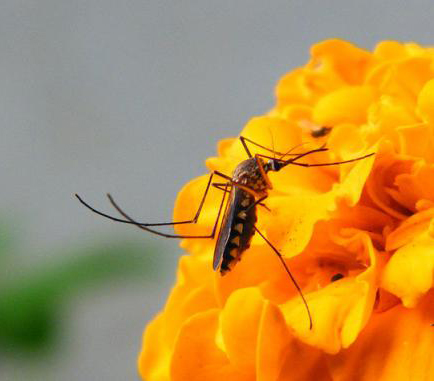
June 3 – What kind of mosquito is biting me?
Much to people’s surprise, only female mosquitoes bite humans and animals.
Both male and female mosquitoes drink plant and flower nectar for food.
Female mosquitoes need the proteins found in mammal blood in order to be able to produce eggs.
When a female mosquito bites with her proboscis, she stabs two tubes into the skin. Through one she injects saliva containing an enzyme that inhibits blood clotting. She sucks blood through the other.
The itching and red bump is actually a mild allergic reaction to the saliva injected.
June 4 -Did you know that mosquito bites can harm your pets?
Mosquitoes can carry the heartworm parasite and can inject this into your dogs and cats when biting.
Transmission of the heartworm parasite occurs in all 50 states plus Washington, DC. It is also found in South America, southern Europe, southeast Asia, the Middle East, Australia, Korea and Japan.
If you do not already have your dogs and cats on preventative heartworm medication, be sure to talk with your vet about this today! Remember that at any time of year, if the temperature is above 50 degrees F, mosquitoes will be active. Depending on where you live, your pets may need to be on medication year round.
If your pets sleep in crates at night, it is a great idea to cover their crates with mosquito nets to ensure they sleep peacefully and no mosquitoes or other bugs bother them!

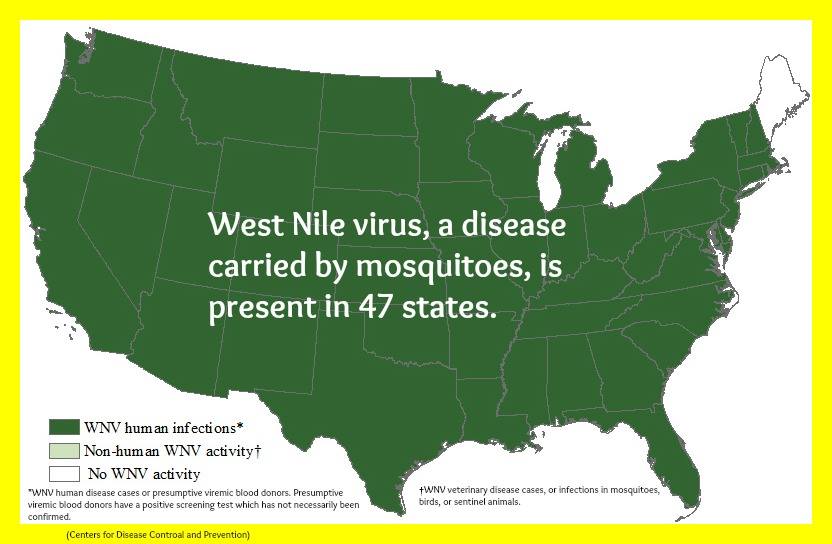
June 5 – What is the most common mosquito-borne disease in the United States?
The answer is the West Nile virus. Many different species of mosquitoes found in the US are capable of transmitting the West Nile virus. Every state except Alaska, Hawaii and Maine have mosquitoes that transmit West Nile virus.
There is no vaccine or medication you can take to prevent this disease. The only thing you can do is avoid getting mosquito bites!
Most people will not even know they have the virus–they will not have any symptoms.
One in 5 people will develop a fever, aches, and other symptoms that may last about a week, though they may experience fatigue lasting 3 weeks or more.
One in 150 people will develop a central nervous system disease. This is very serious requiring hospitalization and prolonged care. It can lead to permanent damage and death. This can strike people at any age, though people over 60, organ donor recipients and people who are immuno-compromised are at greater risk.
To avoid getting the West Nile virus, avoid getting mosquito bites!
June 6 – Swatting at mosquitoes teaches them to stay away!
Mosquitoes are attracted to a variety of scents people produce. The carbon dioxide we exhale is the initial attractant and mosquitoes are further drawn in by the scents of bacteria on our skin, sweat, etc.
Some scientists think that if you keep swatting at mosquitoes, even if you miss, the mosquitoes may learn to associate your scent with the swatting danger and stay away!
In a study published in January 2018 in Current Biology, scientists put mosquitoes and various odors into a vortex which produced vibrations similar to those a mosquito would experience if a person swats and misses. Within 15 minutes, the mosquitoes learned to associate the attractive scents with the vibrations that signaled danger. Instead of approaching these attractive odors, they went towards other odors. And this effect lasted for 24 hours.
So, the next time you’re outside with friends enjoying yourself but being bothered by mosquitoes, swat away! The mosquitoes will learn to avoid you and seek out other delicious odors.

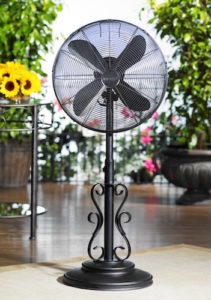
June 7 – What is one of the easiest ways to prevent mosquito bites?
Have a fan blowing on you inside or outside!
Mosquitoes are not strong flyers and the breeze from most fans will be enough to keep them away.
Fans not only create a wind block, the breeze they generate also scatters scents. Mosquitoes find humans by sensing the carbon dioxide we exhale. They then fly in patterns to find the source. A fan spreads the scent out making it confusing to the mosquito and making it much harder to find you for a blood feast!
June 8 – Mosquito fun facts
It would take about 1.2 million mosquito bites to drain all of the blood from your body.
Studies have shown that mosquitoes can drink up to three times their weight in blood!
Mosquitoes have been around since the Jurassic period, meaning they are 210 million years old.
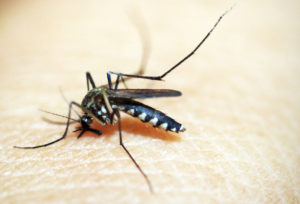
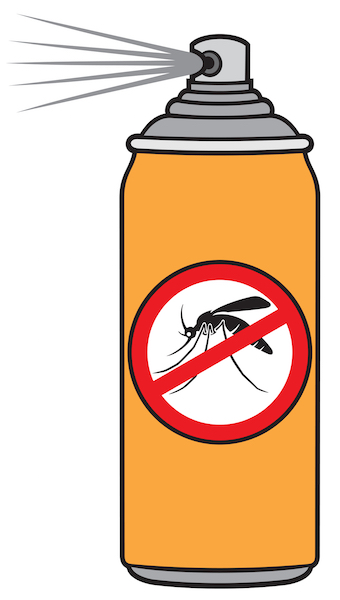
June 9 – Should you use mosquito repellent?
We definitely recommend using mosquito repellent if you expect to be outdoors and in areas with lots of mosquitoes. This is especially important in areas where there is malaria, dengue fever, the Zika virus, West Nile virus, and other mosquito-borne diseases.
It is best to only use repellents that are EPA-approved and they should contain DEET, Picaridin, IR3535, oil of lemon eucalyptus, para-methane-diol (PMD) or 2-undecanone.
To find out if your repellent is EPA-approved, click here: https://www.epa.gov/insect-repellents
If you type any one of these ingredients into Google or Amazon, you will find lots of mosquito repellent options. The higher the concentration of the key ingredients listed above, in theory, the less often you will have to re-apply the repellent.
But just like with sunscreen, if you are outdoors and active and sweating, you will need to re-apply it more often than if you are sitting in the shade.
Always follow the directions on the repellent. If you are going to put repellent on top of clothing, it’s best to test first to be sure it won’t leave a stain.
Put mosquito repellent on your hands to apply to your neck, ears, and face always avoiding your eyes, nose and mouth.
Do not use mosquito repellent on babies under 3 months old. Use mosquito nets for cribs and playpens/strollers instead!
June 10 – Research has shown that mosquitoes appear to prefer beer drinkers!
Does this mean you have to stop drinking beer while enjoying the great outdoors?
No! It just means to be sure to protect yourself from mosquito bites!
- Use mosquito nets inside and outside
- Wear mosquito repellent
- Have a fan blowing on you while you enjoy your beer!


June 11 – What is the best way to protect babies from mosquito bites?
The answer is mosquito nets!
Little people are more vulnerable to mosquito bites and it is essential to prevent bites as much as possible. It is not recommended to use insect repellent on babies under 3 months old and we recommend consulting with your pediatrician before you use insect repellent on any child under 3 years old.
If you choose to use lemon of oil eucalyptus (an EPA-approved ingredient that has been shown to be efficacious), this cannot be used on children under 3 years old.
Your best defense is to use mosquito nets inside and outside.
Keep in mind that even in a house that has screens and is air conditioned, mosquitoes and other bugs can enter through doors and windows as they are opened and closed.
Protect your baby while he or she sleeps by hanging a mosquito net over a crib
This net provides great air flow and is big enough that depending on how your baby’s bedroom is arranged, you may be able to cover both the crib and a changing table.
You can also use mosquito nets to cover playpens and strollers inside or outside.
Tedderfield’s zipper top net has a drawstring base so it can be adapted to fit strollers, playpens and more. The zippers allow for quick and easy access. Put the net over what you want to cover, position the zippers where you want them. Pull the base drawstring tight and then tuck in any excess net.

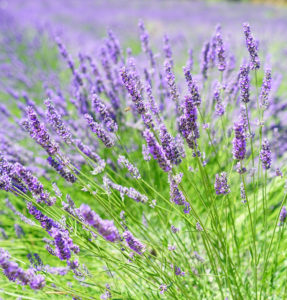
June 12 – Which plants repel mosquitoes?
There are a number of plants that give off scents that mosquitoes do not like and will avoid.
Pictured above are marigolds and lavender. These are both easy to grow and you will notice right away that they have quite strong scents in addition to being beautiful!
Lavender has a high concentration of camphor in it which also repels flies and moths.
Marigolds contain pyrethrum, an ingredient found in many insect repellents.
Other plants that repel mosquitoes include:
- Basil–also great for Italian recipes and salads!
- Catnip–will also make your putty cats happy!
- Sage–great spice for all kinds of dishes, burn it in a campfire for added bug protection.
- Rosemary–great spice and can also be added to a campfire for fragrant bug repellent smoke.
- Mint–great for cooking and various drinks, also can be crushed and rubbed on bug bites for relief.
- Citronella–extracts from citronella are found in many repellents.
Plant these plants in the ground or in planters near the areas where you will spend time and by your doors and windows. The scents from these plants will discourage mosquitoes from hanging out there!
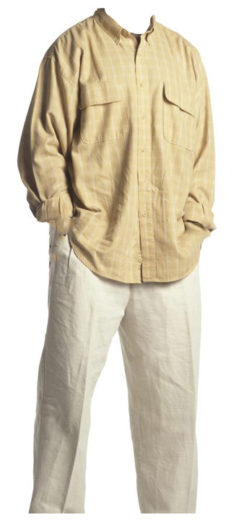
June 13 – What kind of clothing helps prevent mosquito bites?
Research has shown that mosquitoes are attracted to dark colors. It’s best to wear light colored and loose fitting clothing.
Mosquitoes tend to be most active the early morning and evening hours, but there are species that are active throughout the day. Mosquitoes tend to avoid bright sun and are more likely to hang out in shady areas during the day.
It is important to cover up as much as possible with long sleeves, long pants and socks especially at dawn and dusk.
If you will be in areas with malaria, dengue fever, zika virus or other serious mosquito-borne diseases, you can treat your clothes with the insecticide permethrin for extra protection.
If you wear tight fitting, dark colored clothing, mosquitoes will zoom in on you and can bite right through tight fitting fabric!
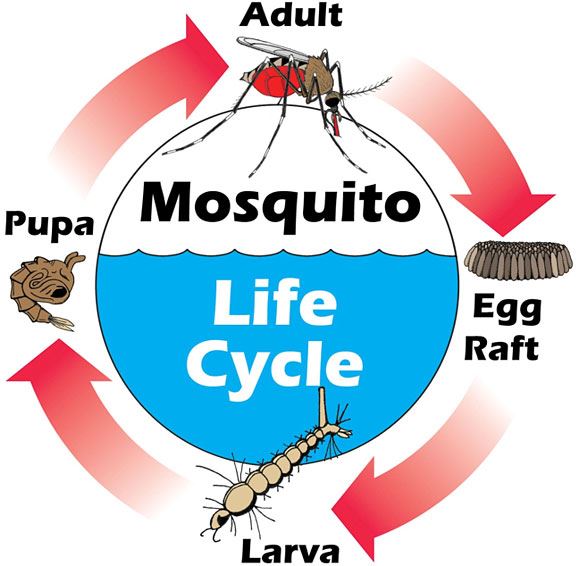
June 14 – What is the life cycle of the mosquito?
The four stages of mosquito life include:
- Egg
- Larva
- Pupa
- Adult
Female mosquitoes drink blood from humans and other mammals to get the protein they need to produce eggs. They lay eggs in water either one at a time or attached together in what are called rafts.
Mosquitoes can lay eggs in as little as a bottle cap full of water. This is why it’s important to remove all standing water from your yard and home to prevent eggs from hatching.
Eggs may hatch into larva within 48 hours or longer depending on the weather. Some species lay eggs that can withstand cold weather and hatch when it’s warm again.
Larvae (larva is singular) live in water and molt four times, each time becoming bigger. Larvae eat microorganisms that live in water.
When a larva molts for the fourth time, it becomes a pupa. The pupa stage is a resting stage similar to a caterpillar that goes into a cocoon and emerges as a butterfly.
When the pupa is finished developing, the skin splits open and an adult mosquito (called an imago) exits.
The adult rests on the water surface for a time to allow its wings to dry and body parts to harden. It will begin feeding within a couple days.
The total lifecycle of a mosquito may be as short as a week or as long as a month depending on the species and the air temperature.
A female mosquito lives 42-56 days. A male mosquito lives for only up to 10 days.
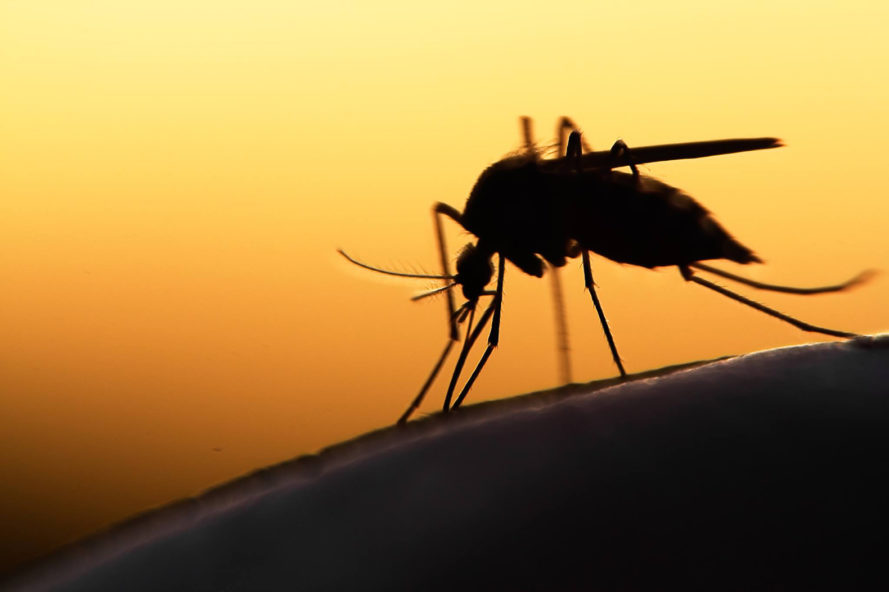
June 15 – How far, fast and high do mosquitoes fly?
Some mosquitoes, like Asian Tiger mosquitoes, stay close to where they hatch with a range of only about 300 feet. Other species have a range of 1-3 miles. There are species in the Midwestern United States that may fly as far as 7 miles away. And finally the mosquitoes that have the largest range are saltmarsh mosquitoes which have a range of up to 40 miles (and occasionally even farther than that).
Mosquitoes only fly 1-1.5 miles an hour. They are considered weak flyers and the breeze from a fan is enough to keep them away from you.
Most of the mosquitoes that like to bite people only fly as high as 25 ft. There have been mosquitoes found in Southeast Asia as high as the 25th floor of a skyscraper. There are certain species of mosquitoes that are able to breed at high altitudes of over 8,000 feet in the Himalayan mountains.

June 16 – I have screens, why are there mosquitoes in my house?
Mosquitoes are crafty! As you walk in and out of the doors to your home, they can move right along with you. Then all they have to do is find some water that stays in place for at least 4-7 days and they can breed inside your house!
This is why it’s very important to look for standing water both inside and outside of your home. Do you have basins underneath plant pots that usually have water in them?
Is there standing water on a placemat that’s kept underneath a dog or cat water dish? Do you have any leaks anywhere that leave standing water?
In addition, mosquitoes can enter through any broken screens in doors or windows. They can also fly in through attic soffits or the vents for bathroom exhaust fans.
If you find a lot of mosquitoes in your home during mosquito season, be sure to sleep under mosquito nets to prevent mosquito bites!

June 17 — Happy Father’s Day
To all the people who are fathers to kids, friends, pets and more, we wish you a Happy Father’s Day!
Need a great gift for Dad? Get him a mosquito net he can use indoors and outdoors!
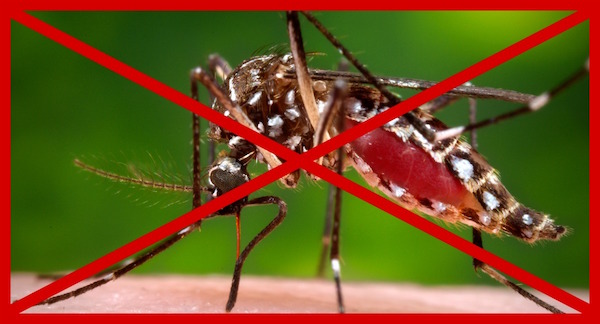
June 18 –How are mosquitoes controlled in the United States?
In the United States, either local mosquito control districts or local government departments utilize integrated mosquito management methods to control mosquitoes in a particular area. These methods are endorsed by the Centers for Disease Control and Prevention (CDC ) and by the Environmental Protection Agency (EPA).
Integrated mosquito management methods include:
- larval and adult mosquito sampling—samples of larval and adult mosquitoes are collected at regular intervals and studied to assess what species of mosquitoes are in an area, to estimate mosquito population size, and to determine if any of the mosquitoes are carrying mosquito borne diseases, etc.
- source reduction—water, particularly stagnant water, is a key mosquito breeding ground, and its removal is an essential part of mosquito control. A mosquito control board might, for example, dig ditches to drain water from an area. Another example is they might collect discarded tires or other objects, which can hold water and be ideal mosquito breeding sites.
- biological control—a mosquito control board might use native or introduced predators and parasites of mosquitoes. For example, a mosquito board might place mosquito fish to a ponds or other water sources which will eat mosquito larvae.
- larviciding and adulticiding–when indicated by surveillance that there is an acute mosquito problem, a mosquito control board may use larvacide, which kills mosquito larvae or adulticide, which kills adult mosquitoes to control mosquito populations. This is usually in the form of truck spraying or aerial spraying of EPA-approved insecticides.
- resistance monitoring—when larvaecides or adulticides are used, mosquitoes are trapped to determine whether or not there is resistance to the pesticides being used. If there is resistance, they will try another kind of insecticide, again all EPA-approved.
- disease surveillance in mosquitoes, birds, horses and humans—mosquitoes are regularly trapped to assess whether or not they are carrying any diseases. Birds are also live trapped and tested (or dead birds are evaluated for signs of mosquito borne disease). Incidence of mosquito borne disease in horses and humans should be reported to medical personnel. This data is collected for a mosquito control board’s area and also sent to the CDC.
- public education—This is an essential part of mosquito control. People can work to reduce or remove standing water from their properties. They can wear EPA-approved insect repellent, wear light-colored and loose fitting clothing, keep a fan blowing on them, and be sure to wear long sleeves, long pants and socks particularly at dawn and dusk. Everyone can help with mosquito control!

June 19—They are conducting aerial spraying for mosquitoes in my area, is it safe for people and pets?
Aerial spraying by airplane is one method of mosquito control in a broader integrated mosquito management plan. Aerial spraying is the fastest method to reduce mosquitoes and their larvae in a large area. This is important particularly if an area is experiencing a mosquito-borne disease outbreak.
Mosquitoes in an area that has been targeted for aerial spraying will be monitored for insecticide resistance. State and local government officials determine which Environmental Protection Agency (EPA)-approved insecticide is likely to be effective.
EPA-approved insecticides go through rigorous study to determine that they are both safe and effective.
A common insecticide used in aerial spraying is Naled. This insecticide has been used effectively in both aerial and ground spraying since the 1950’s.
According to the EPA and the Centers for Disease Control and Prevention (CDC), aerial spraying is not harmful to people, pets, wildlife the environment.
Only a small amount of insecticide is used for aerial spraying, roughly 2 tablespoons of insecticide per acre of land.
The CDC website states: “When applied according to label instructions, EPA-registered insecticides do not pose a risk to human health or the environment.”
The insecticide droplets float in the air and kill mosquitoes on contact.
The CDC website states: “If people prefer to stay inside and close windows and doors when spraying takes place they can, but it is not necessary.”
If you’d like specific information about aerial spraying in your area, contact your local health department or mosquito control board.
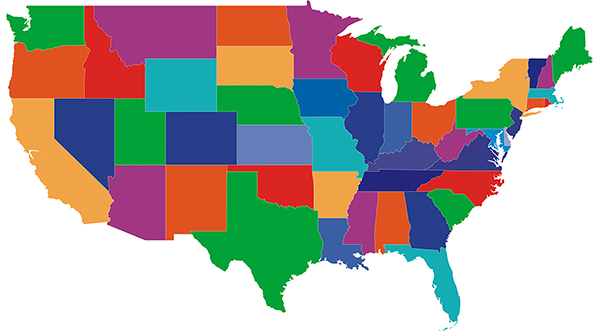
June 20 – Do you live in one of the top 50 mosquito cities?
Each year, Orkin, the pest control company, publishes a list of the top 50 mosquito cities in the United States. These are cities where Orkin gets the most requests for mosquito treatments. (The numbers in parentheses indicate how far that city has moved up or down Orkin’s list compared to 2017).
If you do, be sure to use mosquito nets inside and outside, as well as mosquito repellent, fans, light-colored, loose fitting clothing, etc.
- Atlanta
- Dallas-Ft. Worth, Texas (+4)
- New York (+1)
- Washington, D.C. (-2)
- Chicago (-2)
- Louis, Mo. (+20)
- Houston
- Miami-Ft. Lauderdale, Fla. (-3)
- Kansas City, Mo. (+15)
- Charlotte, N.C. (-1)
- Detroit (-3)
- Memphis, Tenn. (+2)
- Nashville, Tenn. (-3)
- Tampa-St. Petersburg, Fla. (-3)
- Raleigh-Durham, N.C. (+2)
- Los Angeles (+13)
- Philadelphia (+4)
- Birmingham, Ala. (+18)
- Orlando-Daytona Beach-Melbourne, Fla. (-7)
- Austin, Texas (+17)
- Mobile-Pensacola, Fla. (-6)
- Grand Rapids-Kalamazoo-Battle Creek, Mich. (-4)
- Norfolk-Portsmouth-Newport News, Va. (-10)
- Indianapolis, Ind. (+11)
- Phoenix, Ariz. (-5)
- Albany-Schenectady-Troy, N.Y. (+8)
- Lafayette, La. (+5)
- Baton Rouge, La. (+12)
- New Orleans, La. (-2)
- Richmond-Petersburg, Va. (-7)
- Greenville-Spartanburg, S.C., Asheville, N.C (-9)
- Minneapolis-St. Paul, Minn. (-2)
- Boston (-14)
- Wichita-Hutchinson, Ka. (+40)
- Tulsa, Okla. (+14)
- Hartford-New Haven, Conn. (-5)
- San Antonio, Texas (+2)
- Springfield, Mo. (+79)
- Abilene-Sweetwater, Texas (+18)
- Oklahoma City (+48)
- Waco-Temple-Bryan, Texas (+15)
- Baltimore, Md. (-14)
- Huntsville-Decatur, Ala. (+10)
- Shreveport, La. (-2)
- Portland-Auburn, Maine (+17)
- Knoxville, Tenn. (-13)
- Cleveland-Akron-Canton, Ohio (-22)
- West Palm Beach-Ft. Pierce, Fla. (-32)
- Bangor, Maine (-4)
- Harlingen-Brownsville-McAllen-Weslaco, Texas (+21)
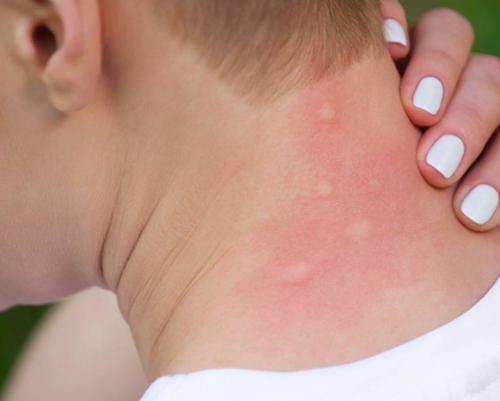
June 21 – Why do mosquito bites itch?
When a female mosquito bites you, she inserts two needle-like tubes. Through one of them she injects her saliva which acts as an anti-coagulant. Through the other she sucks your blood.
Humans are allergic to the saliva she injects and most people have a usually mild, allergic reaction in the form of a raised and itchy bump. Some people are very sensitive and will have a stronger reaction which may require medical attention, and other people, particularly those who have been bitten often, will have a very mild or even no reaction at all.
Mosquito bites from “nuisance” mosquitoes are usually not cause for concern. However, it is important to remember that if you are in an area with mosquito borne disease, mosquitoes could be transmitting dangerous illnesses like West Nile virus, Zika virus, Dengue fever, malaria, etc. Because mosquito borne diseases are found in so many places around the world, it is best to avoid getting mosquito bites!
If the itch from a mosquito bite is making you crazy, there are a lot of “wives tales” treatments…like rubbing it with a banana peel, touching it with a warm spoon, etc. But, because this is an allergic reaction, the best treatment is an anti-histamine or topical anti-itch cream. And should the bites be quite swollen, an over the counter anti-inflammatory can help. If anyone experiences a strong reaction to a mosquito bite, please seek medical attention!
When people scratch mosquito bites to relieve the itch, they sometimes break the skin and this can lead to an infected bite, which may require medical attention.
Mosquito bites are annoying and if they come from mosquitoes that carry a disease, they can be dangerous. The best policy is to follow steps listed above to avoid mosquito bites!
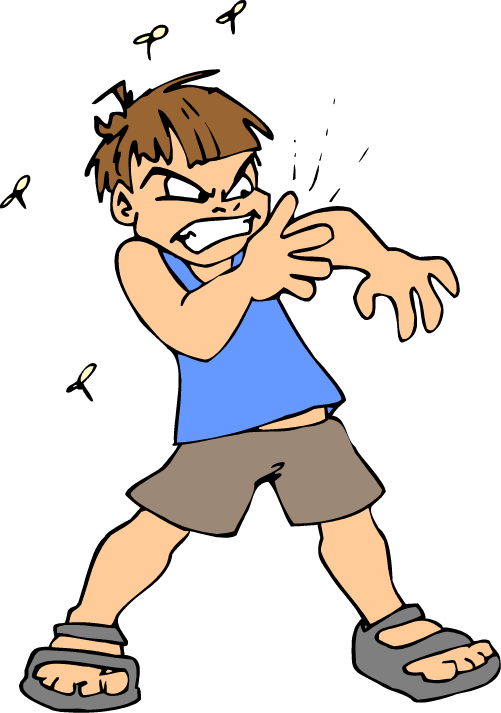
June 22 – Why am I a mosquito magnet?
Research has shown that mosquitoes do prefer some people over others. While all of the reasons for this are not known, here are the answers…
- Mosquitoes are attracted to carbon dioxide, the more you exhale, the easier you are to find. Larger people, pregnant women, and people exercising tend to breathe faster resulting in a greater exhalation of carbon dioxide, making them mosquito magnets.
- Mosquitoes are more attracted to people with type O blood.
- Dark clothing colors are more attractive to mosquitoes than light colors. It is believed that mosquitoes can see dark colors more easily.
- Everyone has millions of bacteria on their skin. Some of these bacteria are more attractive than others–precise research about this does not yet exist. But, if you have been sweating and have not showered, you will have more bacteria on your skin and therefore be extra delicious smelling to mosquitoes!
June 23 – Planning to have a barbecue or picnic on a night with a full moon?
A study showed that mosquito activity increased 500% during a full moon!
Does this mean you need to stay inside on a full moon? Nope!
Use mosquito nets inside and outside,
Wear bug repellent,
Have fans blowing on you,
Wear light-colored, loose-fitting clothing with long sleeves, pants and socks!

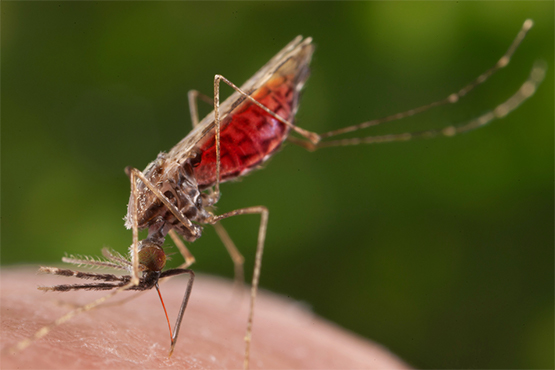
June 24 – Did you know that mosquitoes are considered the deadliest animal in the world?
There are many mosquito borne diseases in the world. The deadliest of these is malaria, which is found primarily in Africa. Malaria kills over 1 million people each year.
In the United States, the most common mosquito borne disease is the West Nile virus, which arrived in the US in 1999. Most people who contract the West Nile virus have either no symptoms or mild symptoms, but 1 in 150 people develop a central nervous system disorder which can result in death.
According to statistics from the Centers for Disease Control and Prevention (CDC), between 1999 and 2016, there were about 46,000 cases of West Nile virus in the United States and around 2,000 deaths from West Nile virus.
There is no vaccine or cure for West Nile virus. Be sure to protect yourself from mosquito bites by following all of the steps listed in this blog post!
June 25 – Pregnant women should avoid traveling to areas with Zika virus.
While there is less in the news about Zika virus at this time, Zika virus is still being transmitted in various parts of the world and still poses a serious risk to women who are pregnant or attempting to become pregnant.
For women who live in areas with Zika virus transmission (either documented or likely), the Centers for Disease Control and Prevention (CDC) advises women to be extremely careful to prevent mosquito bites and to practice safe sex.
After traveling to an area with Zika virus transmission, if you

are pregnant or recently became pregnant, be sure to tell your doctor about your travels.
If you have any of the following symptoms, be sure to contact your doctor immediately: a fever with a rash, headache, joint pain, red eyes, or muscle pain.
We recommend visiting the CDC’s site about Zika and pregnancy: https://www.cdc.gov/pregnancy/zika/protect-yourself.html
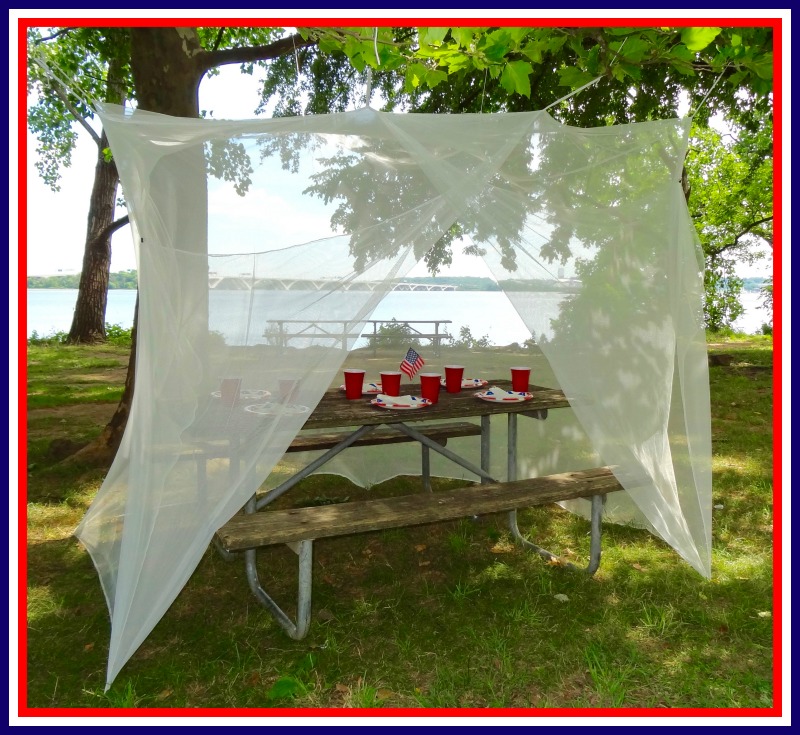
June 26 – Are you ready for July 4th outdoor fun without bugs?
Make it bug free with Tedderfield mosquito nets!
Mosquito nets can cover:
- Picnic tables
- Tables and chairs
- Kiddie pools
- Tents
- Chaise lounges
- much more!
June 27 – Going camping where there are mosquitoes?
Summer is a great time for camping but it can be miserable camping with bugs.
What can you do about this?
- Use mosquito nets to cover things around your campsite like tents, picnic tables, open car doors (if you’ll be eating or sleeping in your car).
- Bring good bug repellent and re-apply as directed.
- If you’ll have electricity, bring fans that can blow towards you, or bring battery operated fans.
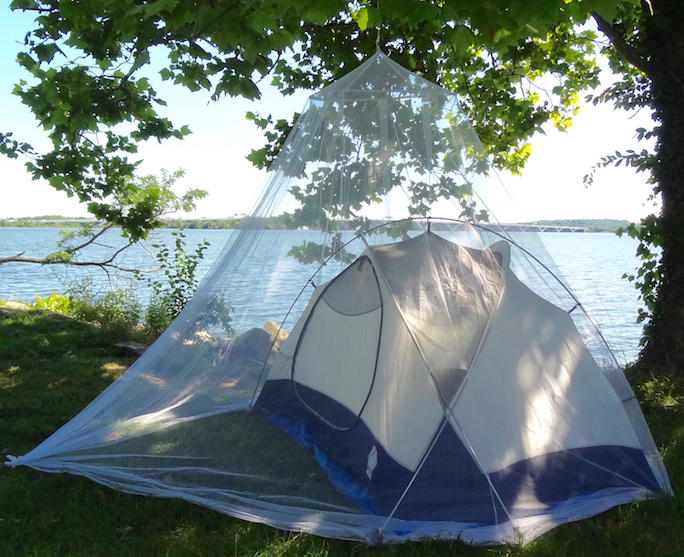
- Wear light-colored, loose fitting clothing and be sure to wear long pants, long sleeves and socks at dawn and dusk when mosquitoes are most active.
- Do not use strong and sweet smelling shampoos, conditioners, lotions–the sweet scents may attract mosquitoes.
- Burn bundles of sage in your campfire–mosquitoes do not like this scent!

June 28 – Did you know horses are also vulnerable to mosquito borne disease?
I’ve always found the sight of horses swishing their tails and munching grass to be so peaceful and relaxing. But, unfortunately, those horses may be being disturbed by mosquitoes and the tail swishes are essential for health.
Horses can catch West Nile Virus and Eastern Equine Encephalitis from mosquito bites. Both of these diseases are serious and can be fatal. There are vaccines to protect horses from both of these viruses. Talk with your veterinarian about vaccination.
You can also protect your horses by removing any standing water (puddles, containers, etc) that are mosquito breeding sites and refreshing watering troughs regularly. In addition, keep horses away from mosquito-infested areas, and turn off barn lights at night.
June 29 – Disney World effectively uses integrated mosquito managment
Have you been to Disney World? Did you notice that despite being located in the middle of a swamp, you were not bothered by mosquitoes?
There’s a great reason for this! Disney World has a comprehensive approach to mosquito management. They have a mosquito surveillance program which traps mosquitoes using carbon dioxide traps throughout the park. This enables them to track mosquito populations and to monitor the mosquitoes for any diseases.
Using this data, they take action against mosquitoes by maintaining populations of natural predators who eat mosquitoes, spraying safe insecticides, and treating water with growth regulators to prevent mosquitoes from hatching.
In addition, they also have a chicken team, which is a critical. Chickens in coops are located throughout the property and are regularly monitored for any signs of mosquito-borne disease like West Nile virus. The great thing is the chickens do not get sick if they have West Nile–a safe warning system!


June 30 – Want to use a natural mosquito repellent?
Choose an EPA-approved repellent that contains oil of lemon eucalyptus!
Oil of lemon eucalyptus comes from the Eucalyptus citriodora tree, which is found in Australia.
A synthetic version of this oil is a good pesticide and a great option for those wanting to stay away from strong chemicals like DEET. It is believed that it works by masking the cues the mosquitoes use to find their blood meals.
In the United States, this oil may be listed as the ingredient (OLE) while in Europe it is listed as (PMDRBO).
To find a repellent with OLE, just type “oil of lemon eucalyptus” into Amazon or Google and you will find plenty of good options.

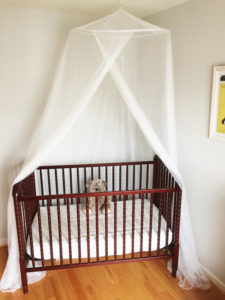
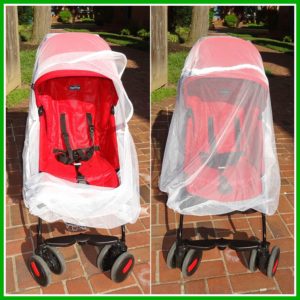
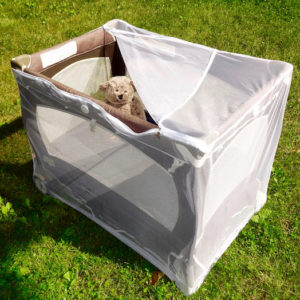

Leave a Reply
Your email is safe with us.